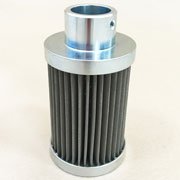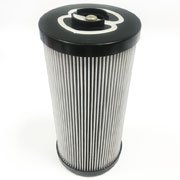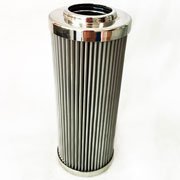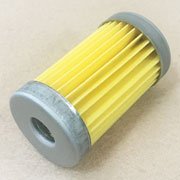Hydraulic Filter Manufacturer
Professional Cost-effective Hydraulic Filter Element Supplier
Get Your Filter Element and Discount
Professional production normal parts numbers of hydraulic filter element, match the accepted brands. Use for various hydraulic systems of industrial equipment, and heavy duty equipment.
Such as suction filter, high-pressure filter, hydraulic return filter, filter carts, and the custom design, manufacture of conventional industrial hydraulic oil filters, also provides the OEM/ ODM services of the hydraulic replacement filter element, No MOQ.
- Excellent Filter Efficiency
- Compliance with ISO Standards
- Replacement Costs Saved over 30%
- No MOQ, Free Samples
- Private Label, Custom Printing
- Brands Margin Increased over 50%
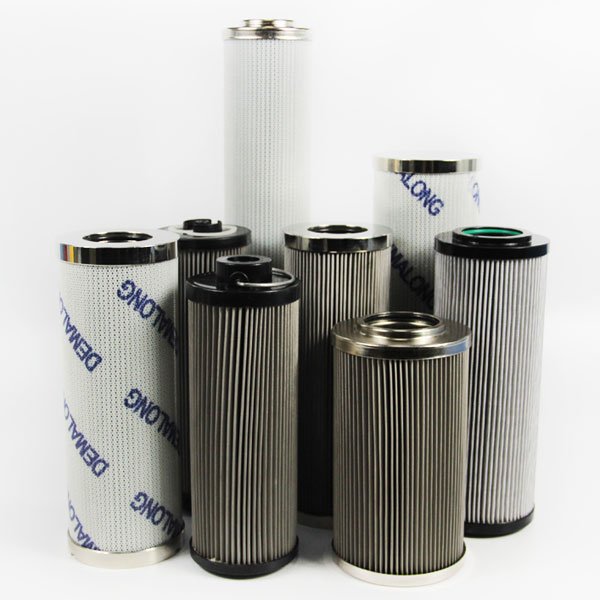
Provides Your Part Number of Filter Element Now!
Try to get a discount from the first time you enquiry about the replacement filter
USERS
No MOQ
Actual Requirement Custom
Wide-range Model of Low-cost hydraulic filter replacement.
TRADER
More than 48,500 types of interchange filter elements, they can cover most recognized manufacturers with stable production and delivery period.
BRAND OWNER
With the ability to flexibly customize design, DML has provided ODM services for hydraulic filter brand customers for nearly 10 years. Such as Germany and other countries
Provide The Hydraulic Filter You Need
Hydraulic Interchange Filter
More than 48,500 units of interchange filter design drawings in our database, which covers most accepted brands filter manufacturers.
There’s the same filter efficiency but have more reasonable price.
By providing the brand, parts numbers, reference photos, or actual operating data of the hydraulic system, samples, etc.
That can quickly determine the appropriate hydraulic filter element for you.
And even can help you optimize the replacement filter element if there are more detailed parameters, like system pressure, initial pressure loss, size, flow rate, filter media, system environment, etc.
For example,
by reducing the initial pressure loss to increase the service life of the replacement filter.
we can produce even better quality interchange filter than the original filter according to the model information.
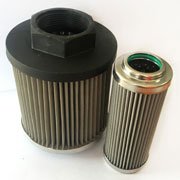
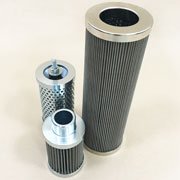
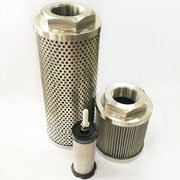
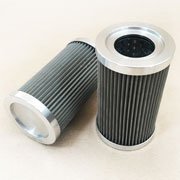
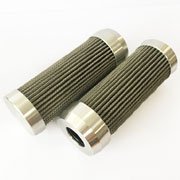
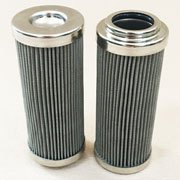
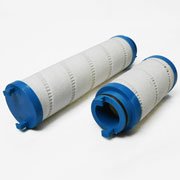
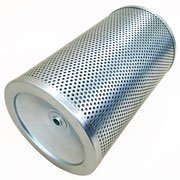
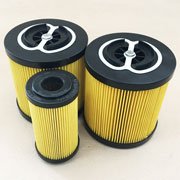
| Filter Media | Stainless Steel Mesh | Glass Fiber | Cellulose |
| Micron Rating | 3~400μm | 1~70μm | 5~40μm |
| Operating Temperature Range | -20℃ ~ 160℃ | -20℃ ~ 160℃ | -20℃ ~ 160℃ |
| Max Operating Pressure | 420bar | 420bar | 420bar |
Hydraulic Filters
For any hydraulic system, we all want to minimize maintenance work. And modern hydraulic systems often require small size and compact structure.
Therefore, the character of the hydraulic system itself and its use factors should be considered at the beginning of the design, including the intervention of the bypass filter system.
Before DML manufactures the hydraulic filters, various elements will be calculated statistically into the design such as system pressure, filter medium, working temperature, flow change, pressure shock, working environment, etc.
Compliance with international standards, reducing the difficulties of maintenance and replacement.
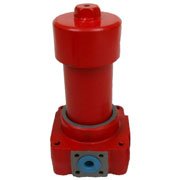
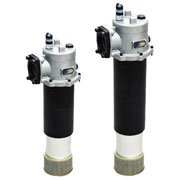
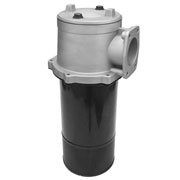
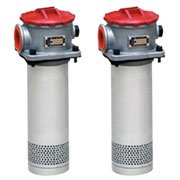
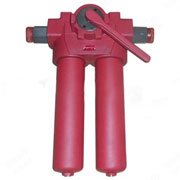
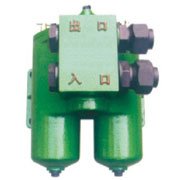
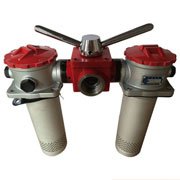
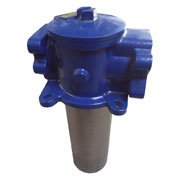
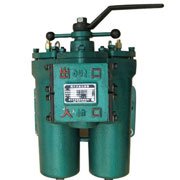
Why Choose DML Hydraulic Filter Manufacturer?
How To Purchase Hydraulic Filter?
Interchange Filter
Only need to provide “parts numbers” or “reference picture”.
(Generally, there are digital codes at both ends of the original filter element end cap.)
Hydraulic Filter Customized
Tell our production experts your needs directly.
We will help and guide you through the purchasing process.
Fast and efficient, 7/24 at your service.
How To Choose A Suitable Hydraulic Filter?
Help you to understand which interchange filter is best for you
DML hydraulic filters engineered for modern industrial & mobile equipment.
The composition and installation position of the filter equipment in the hydraulic system is roughly the same, they are mainly divided into suction filters, pressure line filters (high-pressure filters, return filters, etc.), and other related:
- Respirators,
- Precision filters,
- Poly Junction filter,
- The filter element inside the servo valve, etc.
Here, we mainly understand the filters in the pressure line and return line of the hydraulic system.
These hydraulic filters and filter elements are mainly made of stainless steel mesh, sintered mesh, fiberglass, oil filter paper, etc filter media, and according to the requirements of the hydraulic system (filtration performance, working pressure changes, temperature, flow changes, the precision of components, etc.) to choose suitable filter type and filter elements.
Before that, we shall understand:
For some types of replacement filter elements, if you did not replace the hydraulic oil, or changed the system parameter environment, etc., there is really no need to consider complicated factors.
Choosing the right replacing filter element is actually very easy, that only the original filter parts number information is required as a reference for production.
But, if you choose product customization, then knowing some product information will help you.
The following content is applicable both to hydraulic filters and elements.
Why Use The Hydraulic Filter?
The main function of filtration equipment is to filter out impurities in the system and maintain the cleanliness of the hydraulic oil and the system.
So the filtration performance of the hydraulic filter element is very important.
What Should You Pay Attention To?
Point 1: Filtration accuracy, Filtration efficiency, Filtration ratio (β)
Filtration Accuracy
The unit is μm.
The filtration accuracy Xμm represents the minimum value X of impurities that need to be filtered in your hydraulic system.
For example, the filtration accuracy is 5μm.
It means the hydraulic system requires the filtration of impurities above 5μm in diameter to ensure the normal operation of the system.
There are many basis for filtering accuracy,
it can be:
- ISO cleanliness grade standard of the oil (preliminary judgment can be made according to the type of hydraulic oil)
- The minimum requirements for the size of impurities in the precision components of the system.
- Filter position in the hydraulic system.
Each system will specify the filtration accuracy at the beginning of the design, and it cannot be easily changed, if only pursue high filtration accuracy, it will cause losses of the system.
What’s the difference?
The filtration accuracy higher than the system standard will reduce the fluidity of the hydraulic oil, and the decrease of the flow rate will increase the pressure, causing problems such as high temperature and roar of the system, in addition, the filter element with high filtration accuracy is more likely to be blocked, which reduces the service life of the filter element and increases the frequency and cost of replacement.
If the filtering accuracy is too low to achieve the filtering purpose, it will accelerate the wear of the machine, therefore, if your filter element does not clog and has a long service life, it may not be good, need to be vigilant whether the filter element has a filtering effect or not.
In addition, it should be noted that the system filtering accuracy is required by the actual filtering accuracy.
The filter element should also adopt the actual filtration accuracy, instead of the nominal filtration accuracy. It must be tested to determine the actual filtration accuracy of the filter material.
(Signed filtration accuracy: some filter materials show that can filter impurities with a diameter of 5μm, and may actually only filter impurities with a diameter of 10μm or more through testing).
Filtration efficiency, Filtration ratio (β)
It is the most commonly used index that can accurately express the filtering performance.
β value refers to the ratio of the number of particles larger than a certain size (Xμm) in the oil at the filter inlet to the number of particles larger than a certain size (Xμm) in the oil at the filter outlet.
Therefore, the larger the filtration ratio β value, the higher the filtration efficiency.
The filtration efficiency is calculated by the β value.
The filtration efficiency percentage η = (1-1/βx)*100%.
If:
The requirement of hydraulic system filtration accuracy is 10μm.
Then,
β10=20 and β10=200 have different filtering performances, it is more intuitive to convert into a percentage of filtration efficiency:
- β10=20, its filtration efficiency η = (1-1/20)*100% = 95.00%.
- β10=200, its filtration efficiency η = (1-1/200)*100% = 99.50%.
Obviously, the 99.50% filtering effect is better.
Theoretically, by optimizing the filtering performance, the β value can be higher, but in reality, due to complex changing factors, the β value is not fixed.
If you are still confused about this, you can view more detailed content about β value.
Point 2: Flow performance
Filtration accuracy is one of the factors that determine the performance of oil flow.
The higher the filtration accuracy of the filter element, the smaller the amount of oil allowed to pass (the flow speed may not low). Even if there is a flow valve as an adjustment in the hydraulic system, it is still necessary to pay attention to the importance of the flow capacity of the filter element.
In the hydraulic system
The different filter positions have different flow requirements. High-quality filter elements need to provide dual guarantees of filtration performance and oil passing capacity.
In the view of the filter element, if the filtration accuracy is too high, the flow performance will be reduced, and the resistance to oil flow will increase, at this time, some energy must be consumed to overcome the resistance.
This energy consumption is pressure loss, also called pressure difference.
Which means,
It is necessary to maintain the cleanliness of the oil while reducing energy consumption as much as possible, the main purpose of replacing the filter element is actually to ensure these two points
It is remarkable that:
The flow performance of the filter element will gradually decrease with the running time of the equipment.
Because the dirt holding capacity of the filter element is limited, after filtering to a certain time, the impurities in the oil will block the filter element, because pores that allow the oil to pass through gradually become fewer, the flow performance will naturally decrease.
So the filter elements have their service life.
There are two common ways to increase service life.
1. Increase the dirt holding capacity.
Large dirt holding capacity means a large filter area of the filter element. It increases service life because it takes a longer time for serious blockage. But it is not applicable.
2. Reduce the initial pressure difference.
If the initial pressure difference of the system is 0.3Mpa, we could technically reduce the initial pressure difference of the filter element to 0.2Mpa or 0.15 Mpa, it can prolong the alarm time of the system and increase the service life, it needs specific reference data.
Point 3: Mechanical strength of filter element
The working pressure indirectly affects the cost of filter replacement.
The system pressure and power increase as well with the development of hydraulic technology, the reason for changing system pressure includes filtration time of the filter element, the volume change of the fuel tank, and the stability of the system, it is inevitable to determine the strength of the filter element according to the maximum possible working pressure.
The high-quality filter element must have the ability to withstand the corresponding pressure, not deform, twist and bulge, or even break. (The premise is that the filter element has good sealing performance and installation direction is correct)
So the filter element in the high-pressure pipeline must have enough strength to withstand the high pressure of the system.
The strength is mainly supported by the framework of the filter element.
It can be an additional metal mesh or plastic mesh, which can also be a stainless steel metal frame with various thicknesses, therefore, the type, thickness, and weight of the frame material are basic components of the cost of the filter element.
About the cost of the elements
It needs to pay attention to the unreasonable price caused by the skeleton material in the procurement process (the same applies to the hydraulic filter).
For example, a 3mm stainless steel frame is required, but the actual thickness of the product is only 2mm, so the price is absolutely low, but if the system is not stable enough, the hydraulic impact of the system will destroy the structure of the elements.
And the other hand, if the thickness of a frame exceeding the standard of a low-pressure requirement hydraulic system, it will only add the replacement cost of filter elements.
Point 4: Temperature
The influence of temperature on the filter element has four aspects:
- Temperature resistance
- Corrosiveness
- Tightness
- and Pressure difference
The selection of filter elements should consider the working and ambient temperature, which are two different data.
The high pressure, high speed, and miniaturization of the hydraulic device increase the number of cycles of oil in the hydraulic system, shortens the residence time of the oil in the oil tank and increases the oil temperature, and working in a high-temperature environment also needs high temperature resistant hydraulic filter elements.
All above is the direct relationship between the filter element and the working temperature.
In addition,
There are some indirect reasons that we need to analyze from the application of the filter element.
For example, the effect of working temperature on oil.
Due to the changes in work and ambient temperature, the oil will undergo many changes in nature, the selection of filter elements should refer to these changes.
The working environment of the system can generally divide into four types:
- Indoor and fixed hydraulic equipment with small environmental temperature changes.
- Open-air, cold area or severe cold area and mobile hydraulic equipment, which has large environmental temperature changes.
- Underground and above water hydraulic equipment, which has a humid environment.
- Hydraulic equipment near a high-temperature heat source or open flame.
According to the use environment, system pressure Mpa, and IOS standards, etc.,
Select a suitable oil type for the hydraulic system.
For example,
- Anti-rust, antioxidant mineral oil,
- Hydraulic oil with high wear resistance,
- Hydraulic oil with reduced viscosity,
- High-temperature resistance, non-flammable, or hydraulic oil with lower freezing point/pour point,
- Water treatment, etc.
It is why when replacing hydraulic oil, it needs to drain the old oil as much as possible, and why different types of hydraulic oil cannot be mixed.
The most typical is oil viscosity.
The determination of oil viscosity depends on the starting and operating temperature of the system and the type of pump is used, etc.
What are the specific differences?
High viscosity oil will cause starting difficulty, while low hydraulic system viscosity may make the system working pressure unstable and even increase pump abrasion.
Ignoring the importance of oil viscosity may lead to a wrong selection of too small filter specifications, which causes too high-pressure difference and premature alarms by the polluting transmitter.
And evaluation of the rated operating temperature range is also needed, the most accurate temperature parameters can be used as one of the basis for selecting filter specifications.
For hydraulic systems with high working temperature and pressure, high viscosity oil could obtain better lubricity, for hydraulic systems with low working temperature and pressure, low viscosity oil could help to save energy (other factors will not be stated).
This is one of the factors to keep the hydraulic system working in the best condition.
The correct selection of the operating temperature range can ensure that the filter element will not enter the bypass mode in advance, so avoid excessive selection range of filter elements.
In addition,
Although the viscosity of the oil is beneficial to lubricity, improper use or other factors may increase the resistance and pressure loss of the system.
For example, in the construction machinery, the hydraulic system will generate a lot of heat due to pressure loss, which will increase the oil temperature and accelerate the oxidation of the hydraulic oil, the oxidation of hydraulic oil will produce organic acid, which enhances the corrosiveness of the oil.
So we must consider the corrosion resistance of the sealing ring,
What Are The Filter Elements Used In Hydraulic Equipment?
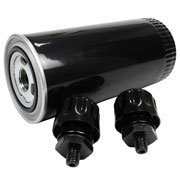
filter breather
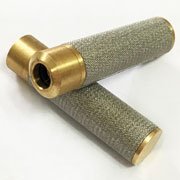
servo valve filter
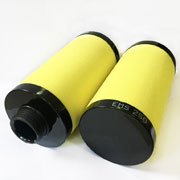
precision filter
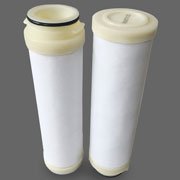
coalescing filter
Suction Strainer
Also named suction filter.
Generally immersed in the bottom, side, or top of the fuel tank, as well as at the suction port of the pump, the purpose is to filter out relatively large impurities and particles to protect the pump.
Generally, it is a bare-metal filter element without cover.
Choose a stainless steel metal filter element with low filtration accuracy to make sure a good flow capacity, if the flow rate of the hydraulic filter is insufficient, it will increase the pressure loss and cause the empty suck of oil, generally, it can be used multiple times through reverse cleaning to reduce the replacement cost.
High-pressure Filter
Also, there are low-pressure and medium pressure filters.
It is the main filtering device of the system, the purpose is to filter out impurities that may invade the downstream valves of the pump and other hydraulic components.
The high-pressure filter does not restrict much about pressure difference, you can choose a higher filtration accuracy hydraulic filter, but must make sure the clearance is higher than that of the hydraulic component itself and meet the requirements of hydraulic oil cleanliness.
High-strength filter elements can withstand the working pressure and impact pressure on the oil circuit, as well as pressure changes and frequent pressure peaks.
Unable to wash.
Hydraulic Return Filter
Installed on the oil return pipeline of the system to filter outworn or invaded impurities in the system before oil returns to the oil tank, it is one of the important hydraulic filter elements that control oil cleanliness, so it requires a high filtration accuracy.
Please pay attention to the return oil flow in the hydraulic system to avoid back pressure in the return oil due to insufficient flow, and pay attention to this problem even has installed a back pressure valve.
The oil return filter element does not need to have the same strength as the high-pressure filter element.
The pressure of the return line is generally not high, while sometimes there will have relatively high hydraulic pressure shocks.
For example,
the reversal of the hydraulic cylinder under high pressure or the sudden power failure of the proportional valve will produce a large instantaneous flow impact, which will generate high pressure on the oil return filter element, for large-volume hydraulic cylinders, when the oil return line is suddenly connected under high pressure, the oil will suddenly relieve of pressure, the resulting instantaneous flow shock will be very large, which may damage the filter element.
Especially when the equipment system is relatively unstable, the strength of the return oil filter should be higher.
Bypass Filter or Filtration System
Adding a bypass filter outside the main hydraulic system, or a filter system that uses a dedicated hydraulic pump and oil filter to form an independent filter circuit out of the hydraulic system.
For example,
the parallel connection of oil filter units can be used as a bypass filter system, the purpose is to maintain the cleanliness of the oil for a long time and reducing the burden of the main filter system by splitting to increase the filtering effect.
This main-pass filtering method will not cause pressure loss in the main oil circuit, and the bypass filter does not need to bear the system working pressure, moreover, the filtering function of some equipment will be damaged due to large pressure and flow fluctuations, while the bypass filter system will not be affected.
So you can select a high filtration accuracy filter element without any consideration of pressure and flow.
Attention: it only indirectly protects the system, cannot ensure the safety of hydraulic components.
Do You Know The Key To Choosing Hydraulic Filter?
Tip 1, Price
Any product has its own bottom line of market price under the premise of quality assurance, once the price of the filter element is much cheaper than the market, or the price you wanted is too low for the filter element manufacturer, the quality is definitely cannot be assured, unless you can afford the cost of third-party testing to reduce the risk of quality.
It is necessary to have a correct understanding of the hydraulic filter system in order to reduce the purchase cost.
For example,
Design
By reasonably optimizing factors such as dirt holding capacity and pressure drop, the replacement cost can be indirectly reduced because of the increased service life of the filter element.
Filter Media
If the circuit only contains some not pollution-sensitive components such as gear pumps and directional valves, or the equipment structure is simple, filters no need to use high-performance characteristics can fulfill the requirements.
So it is an economical choice to use paper or metal mesh filter elements.
Manufacturer
Knowing which kind of hydraulic components match the certain filter elements, and understanding how they affect the performance of the filter, can save some unnecessary costs for long-term operation.
But this method is only suitable for customized design clients, specific process improvements can be made according to needs. The main difference between conventional replacement filter elements is from the level of the manufacturer’s craftsmanship.
Tip 2, Service life
Many people concerned about interchange filter service life.
There are two situations influence service life:
1. Because of the quality problem, make service life is severely shortened or inexplicably lengthened.
The only solution to quality problems is changing suppliers.
2. Bad operating environment of hydraulic equipment.
Too many impurities will shorten the service life of the hydraulic filter element quickly, after all, the dirt holding capacity of the filter is limited, the filter element must be replaced when the filter rating is reached.
If simply extend the use time to reduce the replacement cost, will relatively increase the risk of damage to the hydraulic system, the best maintenance method is to follow the requirement of replacing the filter element and replace it periodically.
Tip 3, Judge the quality by the appearance of the filter element.
The quality can usually be judged by the appearance of the filter element, though the accuracy rate is not high.
However, it is impossible to judge whether it has qualified filtering performance through the appearance of the filter element.
That’s true.
For example, the main criteria for judging quality through the appearance of the filter element is:
- Whether there are defects.
- The surface is smooth or not.
- Workmanship is fine or not.
- The package is exquisite or not.
Or other external factors.
But, you know how?
Sometimes recognized interchange filter brands also have appearance quality problems, some even have irregular sealing edges or over-thick sealing of the filter element.
But it is still the original filter element with a good filtering effect.
What Appearance Factors Can Be Used To Judge The Quality Of The Filter Element?
For example — Weight.
In order to save costs and lower selling prices, manufacturers will reduce the use of raw materials, this kind of low-quality product will first be reflected by its weight.
How did it do that?
A. Framework
Reduced thickness of the stainless steel frame.
Reduced material use for metal end caps.
These will reduce the pressure resistance of the filter element, which leads to crack or deform.
B. Filter media (filter paper, fiberglass, etc.)
Reduce the number of pleats and layers of the filter material (the density or thickness of the pleats of the filter element will be reduced).
Reduce the height of filter pleats (the inner diameter and outer diameter of the filter element will become smaller).
These actions will reduce the filter area of the filter element which cannot ensure the filtering effect.
Either way, it will inevitably lead to the weight reduction of the hydraulic filter element, which can be judged by hand feeling.
Applicable Industries
DML mainly provides hydraulic filters and filter elements for modern industrial equipment and heavy mobile equipment.




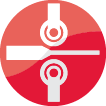




For the purchase of interchange filter element, please refer to its model.
Several aspects need to be considered in the customization of hydraulic filters.
Include:
- System pressure,
- Operating temperature,
- System flow,
- Filtration accuracy,
- Oil cleanliness (ISO cleanliness grade code),
- Working environment,
- Oil corrosive,
And other basic elements.
The more details you provide, the more beneficial to you.
DML can provide you with low-cost and high-performance hydraulic filtration products.
We will provide the most suitable hydraulic filter for your system through detailed design and calculation.


